- Home
- Juliet Marillier
A Dance with Fate Page 5
A Dance with Fate Read online
Page 5
Rowan steps forward to lay a small flower on the creature’s final resting place. It’s only when we are making our way back home that he asks me, “Is that a human thing, that you sing fair words over such a foul being? You know what they are. You have seen what they do.”
“Unless it died at the hand of one of its fellows, and the nature of the injuries did not suggest that, it seems the Crow Folk do not have a monopoly on evil deeds. And . . . I wonder why they are the way they are. If we could know that, if we could talk to them, that might give us the key.”
Rowan makes a noise that tells me just what he thinks of that idea. It is indeed impractical. They see us coming, they attack. And if they don’t attack, they stay high in the trees, watching. They are wild. Unpredictable. Violent. How would a man go about communicating with such a creature? How could I do such a thing without risking not only my own life but those of all Eirne’s folk? I must be mad. A mad minstrel.
I wish Liobhan was here. My sister is the voice of common sense, the voice of practical solutions. She is brave and decisive. I miss her so much. Eirne is my beloved, and I am fond of the strange beings that make up her clan. Along with Rowan, several others have become close friends to me. But Liobhan is my sister. We are almost of an age; I was left on her parents’ doorstep less than a season before she was born. We grew up doing everything together: playing and singing, running and climbing and learning to fight. When I went with her to Swan Island to join the warrior band I thought we would both stay there. Together forever. But it was not to be, and now here I am, wed to an Otherworld queen and, I suspect, about to displease her greatly.
We find Eirne in consultation with Nightshade, her sage. Nightshade has something of the owl about her looks, but in form she is a woman. As for my wife, she might pass for fully human, as I did for so long. Eirne’s hair is brown and glossy; today she has it plaited and pinned up high. Her eyes are a limpid gray, her complexion is like the petals of a wild rose, her expression is sweetly inquiring as she rises from the fallen tree on which she and Nightshade were sitting and steps forward to greet me and my companion. “You were away a long time,” she says, going up on tiptoes to give me a chaste peck on the cheek. “We were concerned.”
I love my wife. For her I gave up my life in the human world, the precious gifts of family and home. I gave up much that was dear to me. But here in the Otherworld I am still finding my place. When it gets hard I think of Eirne’s story—reclaimed by her fey father at the age of five, brought here and left among the unusual folk who make up her clan. At that tender age she discovered she was a queen. Rowan and Nightshade and the others taught her how to rule, how to keep the peace, how to protect her folk as best she could. I am here to help them all; that is my life now.
Sometimes I am a little afraid of Eirne. She is the sweet young woman who sings with me and walks through the woods with me and shares her bed with me at night. But she can turn in an instant to the fey queen who rules over this realm, the one whose anger is like a knife to the heart. I believe Eirne truly loves me. But she does not always listen.
“We found one of the Crow Folk, dead.” I come straight out with it. I know that if I don’t tell the full story, Rowan will, so I go on, “Killed most terribly, perhaps by torture. We laid it to rest as best we could. There were no others of its kind in sight.”
“The bard sang over its resting place,” says Rowan. “Not the kind of fell song he uses to drive them off, but a song such as one might sing over a comrade fallen in battle. Or a dead child.”
Eirne turns her lovely light-filled eyes on me. She says not a word.
“It was a cruel death,” I say. “The wounds had not been made by beak and claws, but by other weapons, and by burning. I did not want to leave the creature lying where it was, out in the open.”
“The Crow Folk are our enemies. They are malign. You say this was a cruel death. What, then, were the many deaths these evil things have inflicted on our own people? Are they not cruel? What of our defenseless little ones, ripped bodily apart and left to die in their blood? You think the Crow Folk worthy of dignity in death? You think them worthy of compassion? You are a warrior, not a priest, Brocc. You are becoming too soft.”
Eirne’s words hang in the air for a little; the rest of us are silent. Rowan looks down at the ground. Nightshade has turned her big eyes on me. I cannot tell what she is thinking, but she is a sage and will have weighed the matter up in her mind. Eirne’s cheeks are flushed; her lips are set tight.
“I am no priest,” I say, holding on to calm. “Only a bard. And sometimes a warrior, yes. The Crow Folk have performed terrible acts of violence. They have killed and maimed. They do not discriminate between good and bad, strong and weak, humankind or animals or Fair Folk. But . . .” I glance at Nightshade. “But do you never consider why they behave as they do? Might not discovering that be the key to ending their attacks? I find it hard to believe they act thus for no reason at all.”
“And yet that is exactly how it is,” says Eirne. She gets up and paces to and fro, her arms wrapped around herself. “We’ve seen it over and over. They will be the death of us; they will be the end of our people. Why would you waste your music over such a creature? Why would you waste your tears?”
She cannot understand this. At such times I am reminded that she has spent far more of her life in the Otherworld than I have of mine; it is less than a year since I came here. In ten years’ time, in fifteen, will I be like her in my thinking? Will the fey part of me outweigh the human? That troubles me. The Fair Folk often seem lacking in compassion; they find it hard to put themselves in other folk’s shoes. “The song was not wasted, Eirne,” I say quietly. “It was a recognition of suffering; it was an acknowledgment of pain and loss; it was a wish that all creatures could rest easy. Perhaps it was only for the singer, who knows? An attempt to make sense of the senseless.”
“You speak wisely.” Nightshade gives me a grave nod of recognition. “My lady, when we face the darkness, when we face a battle whose odds seem impossible, is it not good to explore every pathway that might lead us into the light?”
“You side with the bard.” Eirne is sharp. She has her back turned to us. I know how the long struggle against the Crow Folk has wearied her. I wonder if she hoped her bard and warrior, her new husband, would find a way to banish them forever within a season or two of his arrival in the Otherworld. Alas, I am not so remarkable a man.
“A sage does not take sides,” Nightshade says. “She listens; she muses; sometimes she offers suggestions.”
“And a bard sings and plays. Sometimes a song will come when he does not expect it; sometimes a moment calls for music.” I should stop talking before I say something I regret. Before Eirne tells me a queen decides how things will be done and others obey. Her husband included.
“Your voice is our most powerful weapon, Brocc. Your singing is the only thing that has halted their advance. We have used fire, of course; their fear of it holds them back briefly, until our brands die down or our bonfires are quenched by the rain. But since you came here, since you sang your song of death and flight, they have retreated to the very margins of my realm. At least . . .” Eirne lifts her brows in question.
Rowan has been very quiet. Now he speaks. “The creature we found dead was within the boundaries of our forest, yes. Far to the east but not yet beyond Breifne’s borders.”
“In my realm? Or in the human world?”
Rowan is uncomfortable. He drops his gaze, not meeting Eirne’s eye. Officially, our patrols go only as far as the edges of Eirne’s realm. Our duties do not extend to pursuing the Crow Folk into what was my own world. To do so would put Rowan in particular at great risk; most people out there think the Fair Folk a thing of ancient story, long gone. Perhaps never real. He would be viewed as a freak, an oddity, something to be poked and prodded and kept for show. But as the Crow Folk move easily between worlds we cannot tr
ack their movements without sometimes crossing over. We have not spoken of this to Eirne. Not yet.
“Close to the place where the human kingdom of Breifne, King Faelan’s land, meets that of the neighboring territory,” I say. “On the very eastern edge of the forest.”
Eirne simply looks at me.
“I cannot tell you if the creature was killed within this realm or in the human world.” I will not make this a confession. I refuse to be a child caught out in an act of naughtiness. I am her husband. Her equal. “We laid it to rest close to where we found it. There was no way to tell what had befallen the creature, save what I have already told you of its wounds.”
Still she does not speak. The silence draws out until I feel deep unease. This response is too much. Neither stepping over the border between worlds nor singing kindly over an enemy’s corpse justifies it, in my book. Is something else awry? What have I missed?
“Come,” says Eirne, her voice tight. She holds out her hand to me—this seems a good sign—and at the same time dismisses both Nightshade and Rowan with a jerk of her head. Her mouth is set grim and when I take her hand I feel the tension in her body. She leads me in the direction of the gathering place, but before we reach it Eirne takes a side path into a different part of the woods. Here the trees grow close and the ground is always shaded. A streamlet flows between banks blanketed by water-loving herbs, cresses and the like. Before us a narrow bridge crosses this small waterway, a thing made from a single willow pole. It is a bridge for folk no bigger than the tiny birds that go between Eirne’s realm and the house of Mistress Juniper the wisewoman, carrying messages. A mouse could traverse this bridge warily; a marten could sprint across.
“Over here,” Eirne says, leading me toward this delicate construction.
I will not step on the willow pole and crack it. Even her slighter weight could not be supported there. “Let me,” I say, and lift her in my arms as if she were a child. I take one careful stride across the stream, then set her down on the opposite bank. For a moment she lays her palm against my chest and looks at me with warmer eyes.
“I need to show you something, Brocc. Up here. Come quietly, we don’t want to scare them.”
Scare whom? I walk with her, treading as softly as I can. There’s a rocky outcrop not far off, surrounded by thickly clustering bushes. Eirne leads the way around this until an opening comes into sight, half-concealed by that dense growth. She motions, finger to lips: Shh. Do I hear movement from within that secret shelter?
Eirne opens her mouth and calls softly. She does not use words; her cry is like that of a bird at the earliest moment of dawn, melodious, gentle, almost tentative. I could write a song about that.
There’s a response: a tiny echo of the same sound.
“I have the bard with me,” Eirne says, still keeping her voice down. “May we come closer?”
“Come.”
We move to the opening, a low arch into a shallow cave. Too low for a person of my height to crawl through. The little shelter is well concealed from curious eyes, not only those of humankind but also those of predatory birds, though I imagine a fox or badger might find the place easily enough. Within is one of Eirne’s smaller folk, Gentle-Foot, a being of human shape, but clearly no human, for she comes barely as high as my knee and her body is covered with soft brown fur. I remember that I have not seen Gentle-Foot at our evening gatherings for some time, and when I see what she is cradling in her arms I realize why. I make a small involuntary sound of surprise and wonder, and Eirne glances at me, smiling.
Gentle-Foot has a baby. It is the first young one I have seen in all the time I have lived among Eirne’s folk. I do not need to be told how wonderful this is, and how frightening.
Eirne drops gracefully to sit cross-legged on the ground outside the little cave. I kneel beside her. “How is he faring, Gentle-Foot?” Eirne asks.
“Well, thank you, my lady. He has a good appetite, and so do I. Moth-Weed has gone to fetch food; he will be back soon.”
I’m thinking hard. Thinking of beaks and claws and how far it is to the gathering place from here. The young one would be a single mouthful for a hungry owl. Gentle-Foot herself would be no match for a fox. She and Moth-Weed and the little one need guarding. Or they need bringing in to the area where more of Eirne’s folk live, so we can all watch over them. But I hesitate to say so. Eirne’s face is tender as she regards mother and child; Gentle-Foot looks on her infant with glowing pride. The tight unease in my belly is at war with the delight in my heart; already my thoughts are on the song I will make for this day.
“We will wait with you until Moth-Weed returns,” Eirne says. “Your child is remarkable, Gentle-Foot. Precious beyond any jewel.” No doubt she, too, is thinking how vulnerable they are out here, even in such a well-hidden shelter. Perhaps she is thinking that if Rowan and I were not taking risks out on the borders, we could stand guard over them. And there is a bigger, longer game in play. This child is a sign of hope. Its birth brings the possibility of renewal in Eirne’s realm. Her people may grow and flourish and become stronger, especially now Faelan has come to the throne of Breifne in the human world, a king who respects and understands the old things. More children may come. But the Crow Folk linger; my presence here is not enough to keep them away altogether. And they still wreak havoc in the outside world. By bringing me to see mother and infant, Eirne is telling me I cannot afford a moment’s weakness. I imagine her thoughts now, as she chats with Gentle-Foot in the quiet of the forest. One day you lay a creature to rest with respect and with music. The next day one of its fellows seizes this most tender of small ones and rips it apart before its mother’s eyes. If you would deal with the Crow Folk, you cannot afford softness, Brocc. You must be as hard as iron, and as cruel.
6
LIOBHAN
It’s a testament to Dau’s abilities, I suppose, that even now he’s blind he manages to creep up on me and make me start in fright. I’m doing something I haven’t done for a long while: playing my whistle. Archu said to pack only essential items, but to me this is essential. It’ll stop me from going crazy waiting for Dau to get better, or for this deputation to arrive from Lord Scannal, and let me say my piece before I turn into a snarling monster who couldn’t watch her words if you offered her a bag of silver and a fine riding horse for her trouble.
I’m in the area where horses are exercised now, and because it’s a fair way from the Barn and there’s nobody around, I’m taking the opportunity to run through a new jig I’ve been creating, checking whether what I hear in my mind translates well to the instrument. If the tune is a little too hearty for the situation, too bad. I suppose someday, who knows when, I’ll return to the old routine of being a warrior by day and a bard by night.
So I’m working through the last part of the jig, adding embellishments and cross-rhythms, which takes some concentration, especially when the player’s a little rusty, and a voice says right behind me, “Liobhan.” Then, when I nearly jump out of my skin, he adds in something resembling the supercilious tones of old: “You’re slipping. What happened to being watchful?”
I stick the whistle through my belt, get to my feet, and turn, all in a moment. There he is, apparently all by himself, with a stick in one hand, which I assume is to feel for obstacles before he crashes into them, and an expression on his face that makes me want to cry, because it’s the ghost of the old one from our first training days, when he used that superior manner to make a wall around himself. He sounds every bit what he doesn’t want to be: a chieftain’s son and a man of privilege. I could say something cruel. I could say, Keep that up and you’ll fit right in back at home. But instead I say, “This seemed a safe enough spot. There’s a bench here, about two paces ahead and to your right. Let’s sit down and talk.” I don’t offer to guide him. I wait for him to find it. He leans the stick against the bench and seats himself beside me. He’s lost weight; his face is bones and
shadows. He was so strong before. A comrade to be relied on in battle, a fighter who would test me to my limit even in the bouts he lost. I hate to see that strength draining from him. It shouldn’t happen. I want to ask if he’s feeling better, but he’ll slap me down for that, so I hold my tongue.
We sit there for a while. Long enough to hear the whickering of horses in the nearby stable and sounds of activity from elsewhere in the Barn, where people are still preparing for a mission, and the creak of cart wheels as someone from the settlement goes by on the road that links our outpost to the wider world.
“Why are you here?” Dau asks suddenly. He has his arms folded and his blind gaze straight ahead.
“You mean here playing the whistle in this particular spot, or here on the mainland?”
“Both, if you feel like talking.”
He’s going to make this difficult. That’s no surprise. “I’m supposed to be helping the healers. But since I’ve been told you don’t want me in there, I’ve been making myself useful any way I can.” When Dau says nothing, I go on. “Archu’s been drilling me. He thinks that when this deputation comes from your father, they’ll want to talk to me. He wants to be sure I won’t lose my temper and make things worse.” There, I’ve given him an opportunity to accuse me of poor judgment in choosing to fight without a helm. I’ve given him the chance to curse and shout at me all he wants. I almost wish he would, but he sits there quiet as a mouse. His jaw is tight and his hands are balled into fists. When he still doesn’t speak, I decide to take a different approach. “And I’m here on this bench at this moment not so much because I wanted to work on a new tune in a place where I wouldn’t disturb people as because Archu said I could talk to you at last, and I needed time to think what to say.”
“If that’s the best you can come up with,” Dau says with some bitterness, “the time was insufficient. You want to know why I’m here, Liobhan? I’m here because Archu said I had to talk to you whether I liked it or not. And it seemed best to do so privately.”

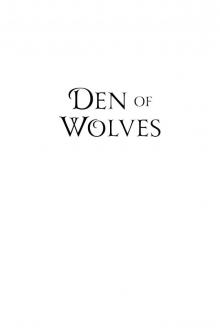 Den of Wolves
Den of Wolves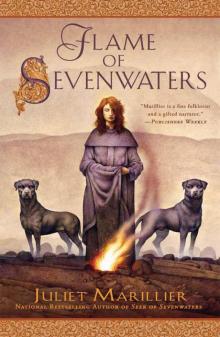 Flame of Sevenwaters
Flame of Sevenwaters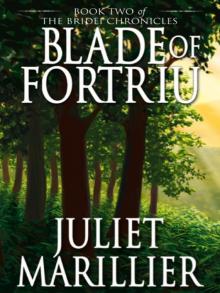 Blade of Fortriu
Blade of Fortriu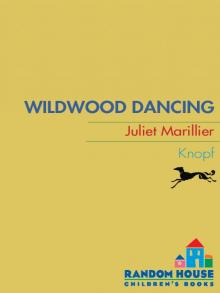 Wildwood Dancing
Wildwood Dancing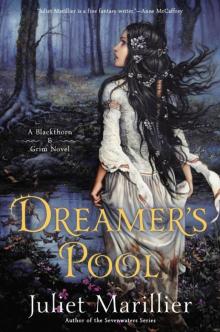 Dreamer's Pool
Dreamer's Pool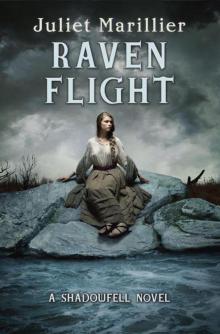 Raven Flight
Raven Flight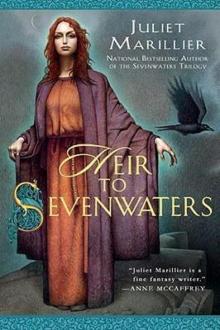 Heir to Sevenwaters
Heir to Sevenwaters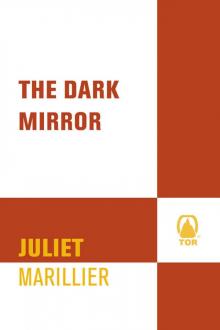 The Dark Mirror
The Dark Mirror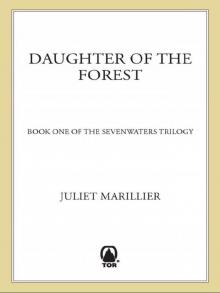 Daughter of the Forest
Daughter of the Forest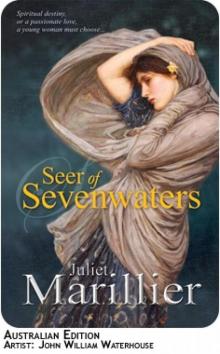 Seer of Sevenwaters
Seer of Sevenwaters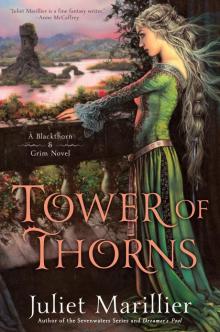 Tower of Thorns
Tower of Thorns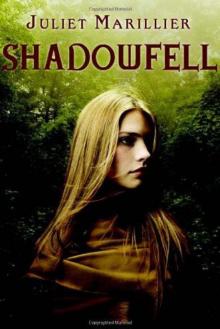 Shadowfell
Shadowfell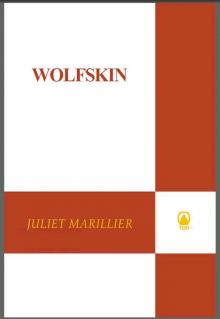 Wolfskin
Wolfskin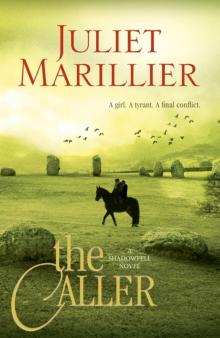 The Caller
The Caller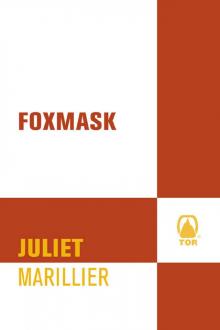 Foxmask
Foxmask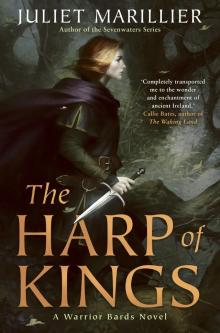 Harp of Kings
Harp of Kings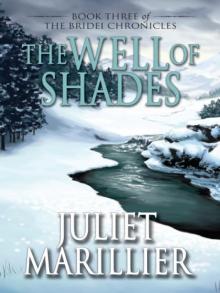 The Well of Shades
The Well of Shades Heart's Blood
Heart's Blood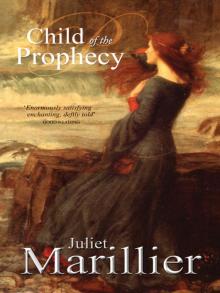 Child of the Prophecy
Child of the Prophecy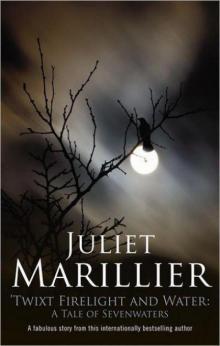 Twixt Firelight and Water
Twixt Firelight and Water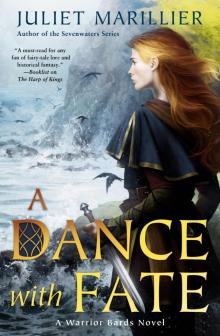 A Dance with Fate
A Dance with Fate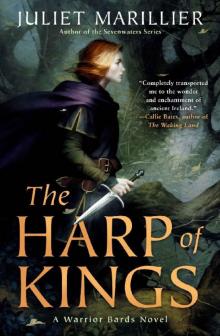 The Harp of Kings (Warrior Bards)
The Harp of Kings (Warrior Bards)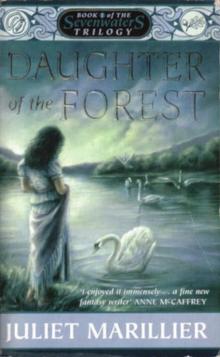 Daughter of the Forest (The Sevenwaters Trilogy)
Daughter of the Forest (The Sevenwaters Trilogy)![Sevenwaters [06] Flame of Sevenwaters Read online](http://i1.bookreadfree.com/i2/04/08/sevenwaters_06_flame_of_sevenwaters_preview.jpg) Sevenwaters [06] Flame of Sevenwaters
Sevenwaters [06] Flame of Sevenwaters![[Sevenwaters 04] Heir to Sevenwaters Read online](http://i1.bookreadfree.com/i2/04/12/sevenwaters_04_heir_to_sevenwaters_preview.jpg) [Sevenwaters 04] Heir to Sevenwaters
[Sevenwaters 04] Heir to Sevenwaters